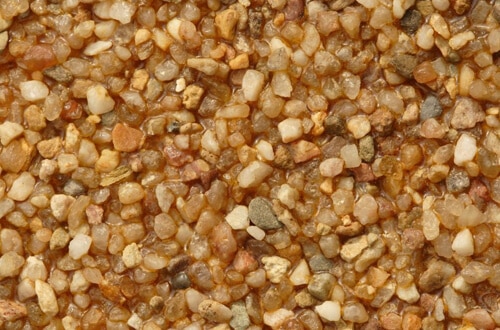Beach Sand Mining Process
Beach Sand
Description
Sand and gravel deposits found on beaches or in rivers and streams, are mostly quartz (silicon dioxide, SiO2) grains. Weathering of rocks such as granite forms these quartz grains. In the process of weathering, the softer, weaker minerals in granite (such as feldspar) are weathered away. The more resistant quartz eventually is ground down in size, but does not break down chemically. In time, these quartz grains accumulate in rivers, streams, deltas and on beaches.

Relation to Mining
Industrial sand mining methods are contingent on deposit type. Unconsolidated deposits are mined using front-end loaders, scrapers, or bulldozers. Material is dug, excavated, and pushed to a central point. The ore-grade material is then loaded onto a truck using standard earth-moving equipment, where it then reports to a stockpile or a processing plant.
A hydraulic dredge uses a suction pipe to excavate the sand, which is pumped through a pipeline to surge piles or directly to a processing plant. The channel or tailings deposit is excavated and placed in a stockpile. The ore-grade material is loaded into haul trucks for transportation to a processing plant.
Uses
Sand and gravel are used for road construction, for mixing with asphalt, as construction fill, and in the production of construction materials like concrete blocks, bricks, and pipes. It is also used to make roofing shingles, used on icy roads in the winter, for railroad ballast, and water filtration.
Industrial sand and gravel is used to make glass, as foundry sand and as abrasive sand.
For some applications, it is the silica content (quartz) of sand that makes it so valuable. The silica itself is needed to make products such as glass. In addition, the physical properties of sand, particularly its abrasive property, make it useful for traction on icy roadways and railroads, and for sandblasting.
Cases Study - Sand Mining
100TPH Beach Sand Zircon Mining Plant in Sierra Leone
Project: beach sand zircon mineral beneficiation
Material: beach sand
Capacity: 100TPH
Country: Sierra Leone
Feeding size: 0-2mm
Raw mineral description:
1. Main mineral composition: zircon sand 58-65%, rutile, magnetic minerals
2. Raw sand contains no slime and little water
Customers requirements:
Remove rutile and light ore, no need to remove magnetic minerals, and increase zircon sand grade to 66-67% from 58-65%. Read More >>>
50TPH Silica Sand Processing Plant in Indonesia
Project: extraction of scrubbed silica sand (use for glass, cement industry)
Material: silica sand
Capacity: 50TPH
Country: Indonesia
Mineral condition description: raw silica sand contains slime and barren rock, which is up to 25-30 CM in diameter.
Customer's requirements: wash the mud off and sieve the barren rock out. Read More >>>
100TPH Silica Sand Processing & Washing Plant in Malaysia
Material: silica sand
Capacity: 100TPH
Country: Malaysia
Feeding size: 6mm
Raw mineral description:
1. Sand particle distribution: <1mm 40%; 1-3mm 30%; 3-6mm 30% 2. Mineral composition: silica, SiO2 94.7%; Iron as Fe2O3 0.35%; Alumina, Al2O3 0.78% Customers requirements: Silica concentrate with >98.5% of SiO2.
Read More >>>
20TPH Beach Sand Mining Plant in India
Material: beach sand
Capacity: 20TPH
Country: India
Feeding size: 0-2mm
Raw mineral description:
1. Main mineral composition: zircon, rutile, ilmenite
2. Raw sand contains no slime and little water
3. Dredgers dig seaside sand directly to the processing line.
Customers requirements:
separate the zircon, rutile, ilmenite Read More >>>
65TPH Silica Sand Washing Plant in Malaysia
Material: silica sand
Capacity: 65TPH
Country: Malaysia
Feeding size: 0-1mm
Raw mineral description:
1. Mineral composition: silicon, SiO2 94%; Iron as Fe2O3 0.35%; others
2. Customer roughly washed the sand and sieved 0-1mm fine sand out.
Customers requirements:
1. Use an attrition scrubber to clean the sand.
2. Magnetic separate the iron, requires the iron contend <0.08%
3. The finished silica sand product is used to make a mirror, which requires low iron content. Read More >>>

